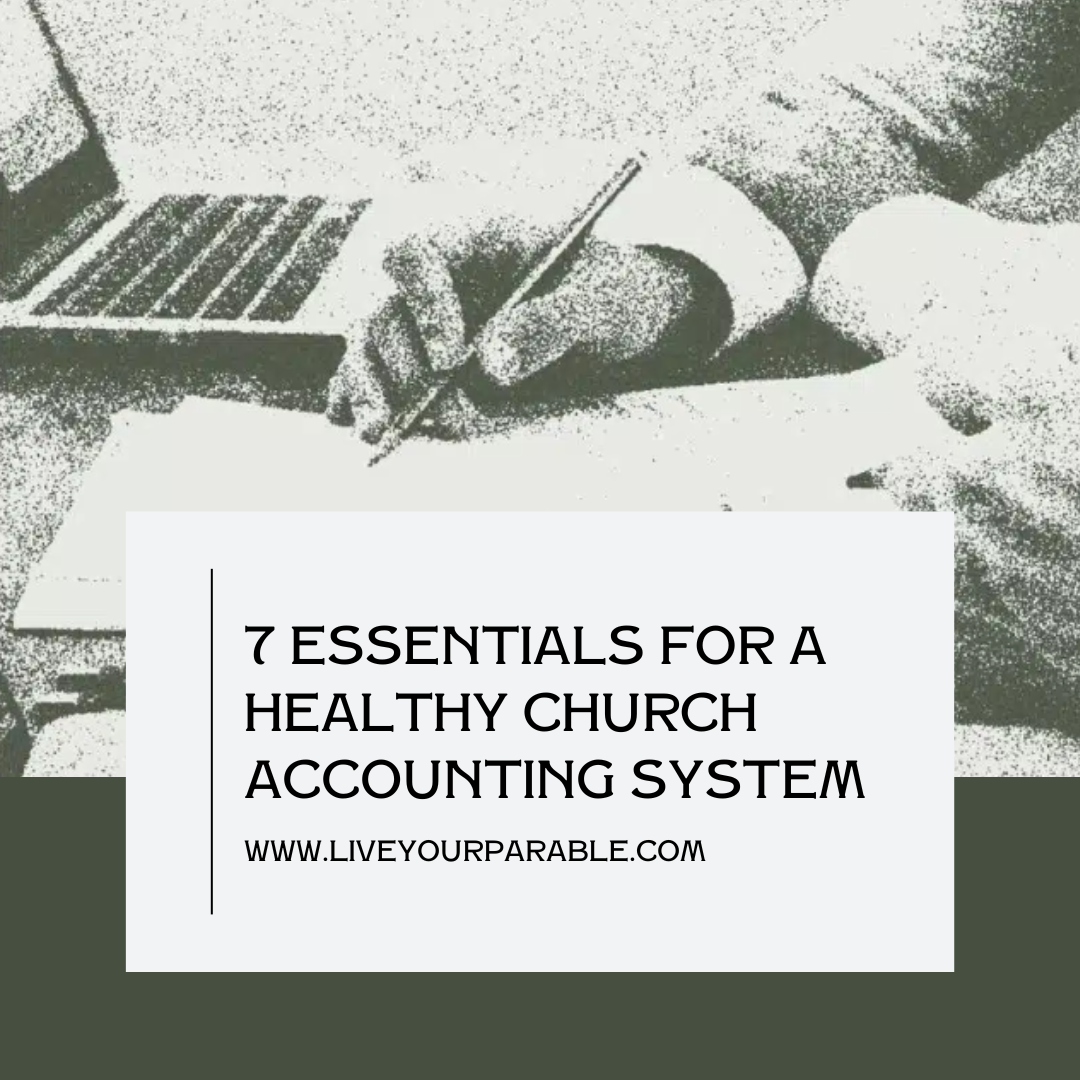We get a lot of questions about the best church accounting software. While software can be great, we find that there’s something more important. It’s a preliminary step that requires less of a learning curve and creates a healthier, more accountable environment for your congregation and staff. It’s a church accounting system.
Believe it or not, you already have one! Whether written or unwritten, intentionally crafted or not, the way you organize, manage and make decisions with your financial resources creates the accounting system for your church.
After several years of working with churches of all sizes to keep their dollars on mission, we have discovered 7 components that make up a healthy church accounting system. They are guaranteed to help you and your team feel confident and in control of your church’s finances.
Overall, the purpose of accounting systems is to protect your money and your people from mismanagement, fraud and any off-mission spending. This ensures that we are fulfilling Paul’s call to live as people of light (Ephesians 5:8-10).

7 Components of a Healthy Church Accounting System
1 – Book Reconciliation
Reconciliation is a complicated word, but all it means is making sure that the money you think you have matches what’s actually in your bank account. Basically, this helps you to know where your money has gone historically and allows you to better control where it will go in the future.
You might be thinking, “That sounds great! But how do I actually do this?” Here’s where church accounting software comes back into play, but it’s less specific to churches. Rather, a quality bookkeeping software can be an immense help. It can take your data and turn it into graphs and charts to help you see and understand your church’s money trends.
In effect, getting out of the weeds, taking a step back, and seeing things from a bird’s eye view can help you see how your money is fueling God’s mission for your church.
2 – Controls
No, not the remote control for your TV or gamepad for video games, but close! These are the policies and procedures that act as fences and guideposts to keep your team efficient and accountable.
The top control we suggest is having two sets of eyes for every counting and recording of weekly offerings. Other incredibly helpful processes include: dual check signing, dual bill paying, and timesheet approval.
The goal here is for your accounting to be a “smooth operator” (cue Sade), safeguarding everyone involved by ensuring everyone knows what to do and who to go to with issues. That way no dollars wander off, whether because of an honest mistake, embezzlement, or something in between. This is why your church needs an accounting system.
Have you heard the phrase, “what starts as duty becomes delight”? Well, that’s how controls might feel at first. They seem tedious, nitpicky and superfluous. But once they’re up and running, you’ll see how they contribute to keeping your money on the mission God has designed for your church.
3 – Payroll
Raise your hand if you’d rather skip the section on payroll all together? We get it. It’s confusing. There are all sorts of tax forms and nuances to remember.
But think of it this way: Doing payroll well is the best way to love your employees. When they are cared for, they can care for the congregation well too.
We know that there are so many questions, concerns, and, quite frankly, some strange terminology when it comes to payroll. Whether you’re cleaning up a mess or trying to start off on the right track, our Complete Guide to Payroll for Churches can help.
4 – Bill Pay
Every bill paid. That’s our motto here at Parable. Sounds simple, right? Bill comes in, you pay it. The end.
We’re sorry to say, it’s not quite that simple. Again, we have to consider accountability and stewardship, because it’s the name of the game!
Our number one suggestions should come as no surprise at this point: Have two sets of eyes on each bill before it is paid.
Here are some things to look for: Is the bill accurate? Is there enough money in the bank to pay it?
Furthermore, this helps prevent double payment, helps you to know where the money is going, and leaves a nice little paper trail, should anyone need to follow it.
Maybe it sounds like overkill, but using these methods of control and accountability ensures that no dollars get lost or slip through the cracks. In summary, it helps you to put every single dollar on your church’s God-given mission.
5 – Technology
Who has time to learn a new system or technology? No one. We know.
But, what if learning a new system saved you time and money in the long run? Unquestionably, it can and does!
Here are some of the church accounting software platforms we highly recommend:
Bookkeeping – QuickBooks Online
Payroll – Gusto
Bill Pay – BILL
Reimbursements – Expensify
Each one of these options can be implemented on your own! But if you don’t have the time or would rather someone with a little more experience handle it, paying someone to help you is a great option.
(Note: We use these platforms too! These + Us = Your Personalized Version of a Church Accounting Software)
6 – Data
Yep, we said the “d” word. If your eyes just glazed over, we understand. But hear us out! Data is just information that helps you make decisions! Prayerful ones, to be exact.
Here’s the monthly data you need to keep an eye on:
1. Monthly giving and any other income
2. Monthly Expenses
3. Cash on hand and how many months that translates into
4. Number of donors
5. Average giving per donor
6. Average weekly attendee count
In conclusion, knowing these numbers and seeing how they change month-over-month will help you spot trends that are impacting your church. The aforementioned platforms can help you track this data with ease!
7 – Strategy
Last, but certainly not least, is strategy. This is where your pastoral giftings align with the data and processes you’ve got in place. Strategies should be created based on information you’ve gathered from the data you’re tracking along with a heaping amount of prayer and discernment from the Lord.
As ministry workers, you should be no stranger to strategy. In fact, it’s the part where your giftings and talents shine! You get to dream and cast a vision for the future, then use that strategy to guide your church forward. Those dreams can become a reality because of the work you’ve done to create accounting systems that allow you to manage and protect the resources you’ve been charged to steward.
Put Your Church’s Dollars on Mission
Download our free Church Financial Toolkit and learn how to create an accounting system that sets the foundation for stewarding God’s mission for your church.
Remember: Your church needs an accounting system first and foremost, then you can consider a church accounting software.
